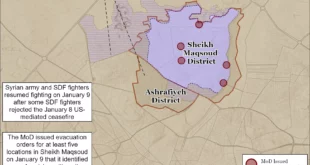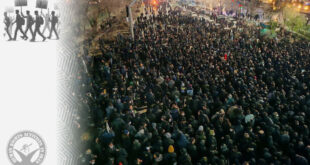Israel is concerned by recent declarations by Russian President Vladimir Putin and other officials that could signal a shift in Moscow’s views toward it.
Israel has quietly expressed to Russia its dissatisfaction over statements issued by Moscow on the Hamas war, a senior Israeli diplomatic source confirmed to Al-Monitor.
On Tuesday, Israel’s public broadcaster Kan cited an unnamed Israeli official as saying, “The Russian conduct and also the statements against Israel do not correspond to the seriousness of the situation Israel is in, which is a state of war.”
Eighteen days after Hamas’ Oct. 7 attack against Israel, Russia’s position on it became clear when President Vladimir Putin blamed the United States for the escalation. Now Israel is concerned about a major shift in Russia’s Middle East policy that could increase security threats to it from Syria and elsewhere.
On a visit to North Korea Thursday, Russian Foreign Minister Sergey Lavrov said, “We are witnessing attempts to blame everything on Iran again. We consider these quite provocative.” He added, “The Iranian leadership takes a responsible, balanced position and calls for preventing this conflict from spreading to the entire region, to neighboring countries.”
Last Monday, on a visit to Tehran for talks on Armenia and Azerbaijan, Lavrov slammed the United States for allegedly interfering with the Israeli-Palestinian conflict. “This includes sending two aircraft carrier groups to the conflict zone, several thousand combat soldiers,” said the Russian minister, adding, “The more proactive steps are taken by any state, the higher the risk, the higher the danger that the conflict will escalate.”
Lavrov’s remarks came in a series of statements issued by Russian officials, including Putin himself and Foreign Ministry spokespeople, that skirted condemnation of Hamas’ actions, slammed US Middle East policy and praised Iran.
Israeli spokespeople and decision-makers have remained publicly silent on the Russian statements so far, even amid Putin’s inflammatory comparisons. “Various scenarios are emerging, including the possibility of military and non-military measures being taken against the Gaza Strip comparable to the siege of Leningrad during World War II,” Putin said Oct. 13 on a visit to Kyrgyzstan.
Why is Israel remaining silent?
The Israeli government fears provoking the Russians for several reasons, Israeli diplomatic sources say. The main one is the ongoing coordination between Israeli and Russian forces in Syria since 2015. A communication channel between the two militaries enables Israeli jets to strike Hezbollah and Iran-affiliated targets inside Syria without Russian interference.
Still, experts from the Israeli Institute for National Security Studies and other Israeli think tanks now warn that the Israel Defense Forces can no longer count on such coordination lasting and should therefore prepare itself for a different situation.
Arkady Mil-Man, head of the Russia program at the Israeli Institute for National Security Studies, said the events that unfolded on Oct. 7 triggered a tectonic shift in Russia’s approach to Israel.
“The prevailing concept in Israel regarding its security relations with Russia simply collapsed on Oct. 7. Still, signs of this collapse had already started to appear in 2014 [with the annexation of Crimea], and more so since the Russian invasion of Ukraine,” said Mil-Man, who has served as Israel’s ambassador to Russia and Azerbaijan.
“For years, Israel considered Russia a friendly nation. Prime Minister Benjamin Netanyahu nurtured a special relationship with Putin. The Israeli assumption was that these personal and diplomatic relations would protect Israel’s security,” noted Mil-Man.
“Russia sought to control the Assad regime,” he said, referring to the government of Syrian President Bashar al-Assad. “In parallel, it was not interested in the Iranians gaining too much of a foothold over the country. In Israel, we estimated for years that our mutual interest against the Iranian military entrenchment in Syria, and the deconfliction mechanism put in place, established a stable basis for cooperation or at least coordination.”
Mil-Man observed that Moscow had previously stressed that Israel’s security was also important to it because of the large Russian community living there, but such assertions have disappeared in recent years. With the invasion of Ukraine in February 2022, Moscow reinforced its alliance with Iran, leaving Israel to face an axis of Russia, Iran, Hezbollah and Hamas that he believes is here to stay.
On Thursday, the Russian Embassy in Israel updated the number of dual Israeli-Russian nationals killed on Israeli soil to 19 and said seven more were still missing. The statement did not mention the attack by Hamas or suggest that the missing were being held by the group in Gaza, noted Mil-Man.
“These kinds of statements should serve as a wake-up call for Israeli decision-makers. The whole Israeli doctrine preaching neutrality vis-a-vis Russia despite Russian antisemitic remarks in the past years and months has proven wrong. This could have real security consequences for us,” he said.
“Last Tuesday, the UN restrictions on transferring missile technologies to Iran expired, and Russia said clearly that it need no longer obey these restrictions,” said Mil-Man. “The moment Moscow estimates that reining in Iran in Syria is no longer in its interest, things could change quickly.”
Business as usual for Russia
Omer Dostri, a researcher at the Jerusalem Institute for Strategy and Security, has a different perspective. For him, Russia has always tried to tread carefully with all sides. He believes that Israel’s channel of coordination with Russia will continue to operate even against the backdrop of the “poisonous, bordering on antisemitic remarks and even support of Hamas expressed in the last few days by the Russian leadership.”
Israel and Russia have shared several moments of military friction. In 2018, Russia blamed Israeli jets for putting an Ilyushin Il-20 plane in the path of Syrian air defense systems, killing 15 crew members on board.
Dostri went on, “Still, coordination between the IDF and the Russian military continued. Russia has an important naval base in Tartus and an air base near Latakia, in Syria. As long as Israel is careful over these bases, coordination is likely to continue.” He feels that Moscow is likely to continue a dual policy of harsh declarations against Israel but continued military cooperation on the ground.
Mil-Man, however, disagreed with that assessment. “Russia will continue with the communications channel on Syria only as long as it serves their interests,” he said. “With the war in Ukraine, Putin’s prime interest lies in reinforcing his anti-American alliance. The moment Putin’s self-preservation shifts completely toward security cooperation with Iran, Moscow could start using the communications channel as leverage to pressure Israel.”
 Eurasia Press & News
Eurasia Press & News



